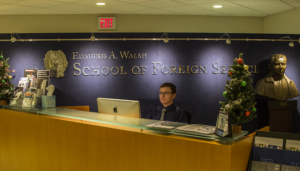The School of Foreign Service announced its undergraduates will be able to minor in disciplines within Georgetown College as part of an interschool collaborative effort Dec. 6.
The announcement comes after the SFS Faculty Council voted in favor of the policy Nov. 30. The council’s vote awaits approval by the School Council of the SFS, a body which oversees the school’s educational policy, SFS Academic Council Vice President Forrest Gertin (SFS ’20) said. If approved, College minors can be taken by SFS students, including current juniors, as long as the appropriate course requirements are fulfilled.
SFS Dean Daniel Byman expects the change to pass and go into effect in the upcoming academic year.
Under the new policy, college minors can be taken by SFS students, including current juniors, as long as the appropriate course requirements are fulfilled. Minors in the government, history and economics departments will be limited to students pursuing a major outside of those fields, according to the Dec. 6 news release. For example, an international history major cannot obtain a College minor in history.

Though the SFS did not historically offer minors, students have been able to choose from a limited selection of certificate programs, which emphasize regional or thematic areas of interest. A 2016 decision allowed SFS students to pursue minors exclusively in the foreign language departments of the College.
Students will be permitted to add a total of any two supplements to their majors, including both minors and certificates, according to the news release.
Opposition to allowing SFS students to pursue college minors was grounded in the belief that minors presented an unnecessary addition to the SFS curriculum, according to Byman.
“The belief was that SFS, which has an interdisciplinary curriculum, did not need minors and that the many SFS requirements made minors impractical,” Byman wrote in an email to The Hoya.
The recent vote by faculty members comes after years of SFS students pushing for access to minors in the College, Byman wrote.
“The decision to allow minors was very much a student-driven initiative,” Byman wrote. “For years, students have wanted the SFS to allow minors, believing that they help a student diversify intellectually and provide benefits on the job market.”
Some students felt the original policy limited their academic opportunities, leading the student organization SFS Academic Council to press for change.
Students have sought access to College minors due to the complementary nature of certain academic disciplines, Gertin said.
“If you think about it, you’re someone who is studying international political economy who’s also interested in financial journalism, getting a journalism minor, which is currently — or used to be — not allowed, could really complement your degree,” Gertin said.
The original policy seemed unfair to SFS students as the only school with this restriction, according to Gertin.
“It’s an issue of fairness. If my roommate is in the College, why should we be able to take the same courses and the SFS student not receive the same credential?” Gertin said.
The decision comes amid a curriculum restructuring process by the SFS that started in 2016 to update the curriculum in advance of the school’s centennial in 2019. Starting in fall 2018, the school added a science requirement to its core curriculum with the aim of helping students understand scientific issues through the context of international affairs.
The decision will help provide university guidance to students who would have otherwise pursued their interests independently, Byman wrote.
“My hope is that SFS students will take advantage of minors both to round themselves out and to go deeper on subject areas that complement their SFS studies,” Byman wrote. “Another advantage of a minor from a learning point of view is that it is a structured set of classes. Thus students who complete it will gain a better understanding of the subject than if they did the same number of courses on their own.”
Both Gertin and Byman noted the success of the original 2016 initiative that allowed SFS students to minor in foreign languages assured students and faculty that further expansion was a good next step.
SFS students would not be the only students affected by the decision, according to David Edelstein, vice dean of faculty in the College. While the plan originated in the SFS, it has since become a joint initiative with the help of the College.
Faculty members from the schools hope the policy shift yields mutual benefits, Edelstein said.
“I would just emphasize the cooperative spirit in which this was accomplished. Both Georgetown College and SFS are stronger for having access to the resources and offerings of the other,” Edelstein wrote in an email to The Hoya.
This article was updated on Dec. 5 to correct Gertin’s graduation year. This article was updated on Dec. 6.




















